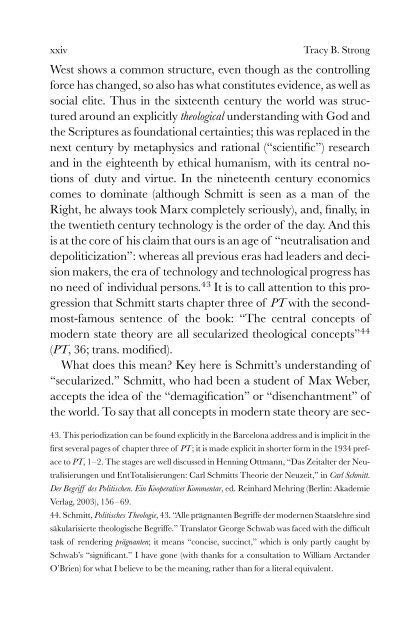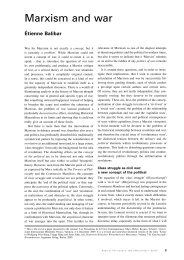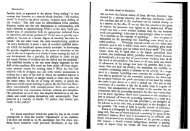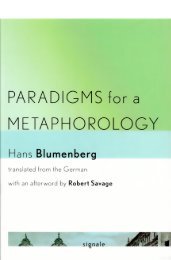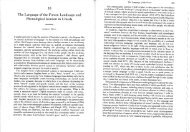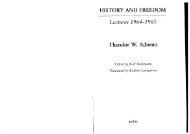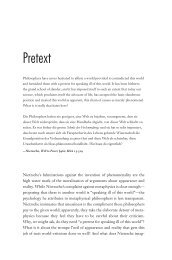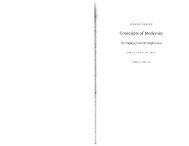Schmitt-Political Theology I.pdf - Townsend Humanities Lab
Schmitt-Political Theology I.pdf - Townsend Humanities Lab
Schmitt-Political Theology I.pdf - Townsend Humanities Lab
You also want an ePaper? Increase the reach of your titles
YUMPU automatically turns print PDFs into web optimized ePapers that Google loves.
xxiv Tracy B. Strong<br />
West shows a common structure, even though as the controlling<br />
force has changed, so also has what constitutes evidence, as well as<br />
social elite. Thus in the sixteenth century the world was structured<br />
around an explicitly theological understanding with God and<br />
the Scriptures as foundational certainties; this was replaced in the<br />
next century by metaphysics and rational (“scientific”) research<br />
and in the eighteenth by ethical humanism, with its central notions<br />
of duty and virtue. In the nineteenth century economics<br />
comes to dominate (although <strong>Schmitt</strong> is seen as a man of the<br />
Right, he always took Marx completely seriously), and, finally, in<br />
the twentieth century technology is the order of the day. And this<br />
is at the core of his claim that ours is an age of “neutralisation and<br />
depoliticization”: whereas all previous eras had leaders and decision<br />
makers, the era of technology and technological progress has<br />
no need of individual persons. 43 It is to call attention to this progression<br />
that <strong>Schmitt</strong> starts chapter three of PT with the secondmost-famous<br />
sentence of the book: “The central concepts of<br />
modern state theory are all secularized theological concepts” 44<br />
(PT, 36; trans. modified).<br />
What does this mean? Key here is <strong>Schmitt</strong>’s understanding of<br />
“secularized.” <strong>Schmitt</strong>, who had been a student of Max Weber,<br />
accepts the idea of the “demagification” or “disenchantment” of<br />
the world. To say that all concepts in modern state theory are sec-<br />
43. This periodization can be found explicitly in the Barcelona address and is implicit in the<br />
first several pages of chapter three of PT; it is made explicit in shorter form in the 1934 preface<br />
to PT, 1–2. The stages are well discussed in Henning Ottmann, “Das Zeitalter der Neutralisierungen<br />
und EntTotalisierungen: Carl <strong>Schmitt</strong>s Theorie der Neuzeit,” in Carl <strong>Schmitt</strong>.<br />
Der Begriff des Politischen. Ein Kooperativer Kommentar, ed. Reinhard Mehring (Berlin: Akademie<br />
Verlag, 2003), 156–69.<br />
44. <strong>Schmitt</strong>, Politisches Theologie, 43. “Alle prägnanten Begriffe der modernen Staatslehre sind<br />
säkularisierte theologische Begriffe.” Translator George Schwab was faced with the difficult<br />
task of rendering prägnanten; it means “concise, succinct,” which is only partly caught by<br />
Schwab’s “significant.” I have gone (with thanks for a consultation to William Arctander<br />
O’Brien) for what I believe to be the meaning, rather than for a literal equivalent.


